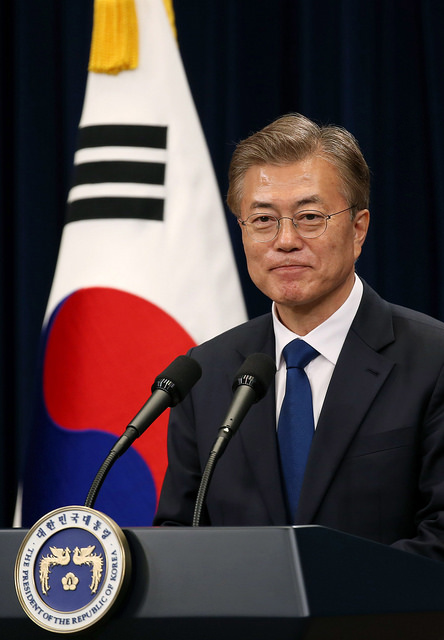News
SKorea to probe military plan to quell Park protests

Current President Moon Jae-in, during a visit to India on Monday night, ordered his defence minister to establish a special team to investigate the document. (Photo: Republic of Korea/Flickr/CC BY-SA 2.0)
SEOUL, Korea, Republic Of – South Korea’s president has ordered an investigation into a revelation that the military drew up a plan to mobilize troops if protests worsened over the fate of his impeached predecessor last year, officials said Tuesday.
Military intervention in civilian affairs is an extremely sensitive issue in South Korea, which was ruled by army-backed dictatorships for decades before achieving democracy in the late 1980s. During the harsh rules, authorities occasionally proclaimed a martial law and other decrees that allowed them to station combat soldiers, tanks and armoured vehicles on streets or at public places like schools to prevent any anti-government demonstrations.
The latest controversy over military intervention flared last week when a ruling party lawmaker disclosed a document showing the military planned to use troops to maintain order if rallies either opposing or supporting then-President Park Geun-hye grew violent after a constitutional Court ruling on her impeachment over a corruption scandal.
The Defence Ministry later confirmed the existence of the document, which was written during Park’s presidency by its intelligence arm called the Defence Security Command.
Current President Moon Jae-in, during a visit to India on Monday night, ordered his defence minister to establish a special team to investigate the document, Moon’s spokesman Kim Eui-kyum told reporters in Seoul on Tuesday.
The investigation team won’t be supervised by Defence Minister Song Young-moo and will be allowed to operate independently for a fair investigation, Kim said.
The Defence Ministry said later Monday that it plans to “tightly and thoroughly” carry out the presidential order. Spokesman Lee Jin-woo refused to answer specific questions on how the investigation would proceed and how far it would reach.
Before the court ruling in March 2017 that eventually upheld Park’s impeachment and formally drove her from office, South Korea was embroiled in its worst political turmoil in decades. Millions had taken to the street to call for Park’s ouster in largely peaceful demonstrations, but there had also been an increasingly vehement protests supporting Park.
Under the document, the Defence Security Command assessed that anti-Park protesters would call for a “revolution” if the court rejected Park’s impeachment. Pro-Park forces, for their part, would consider the court’s confirmation of Park’s impeachment a “rebellion,” according to the document provided by the office of lawmaker Lee Cheol-hee.
The document said either group of protesters could fire firebombs in street rallies, set fire on police stations and steal guns there and try to occupy the constitutional Court’s building and the presidential place if the court didn’t rule to that group’s satisfaction. The document said the protests would cause a crisis in national security at a time when North Korea was expected to launch provocations over South Korea’s springtime military drills with the United States.
According to the document, the command considered putting troops in public places if police failed to suppress such violent protests but stressed the need to be cautious before deciding whether to declare a martial law, given the public would widely have a negative view of such a declaration.
The constitutional Court’s ruling sparked rallies denouncing the verdict. Protest violence left three of Park’s supporters dead, but didn’t escalate to a level that posed a threat to national security. The military plan wasn’t implemented.
Park earlier this year was sentenced to 24 years in prison for corruption. Moon was elected in a special vote triggered by Park’s early departure.





















